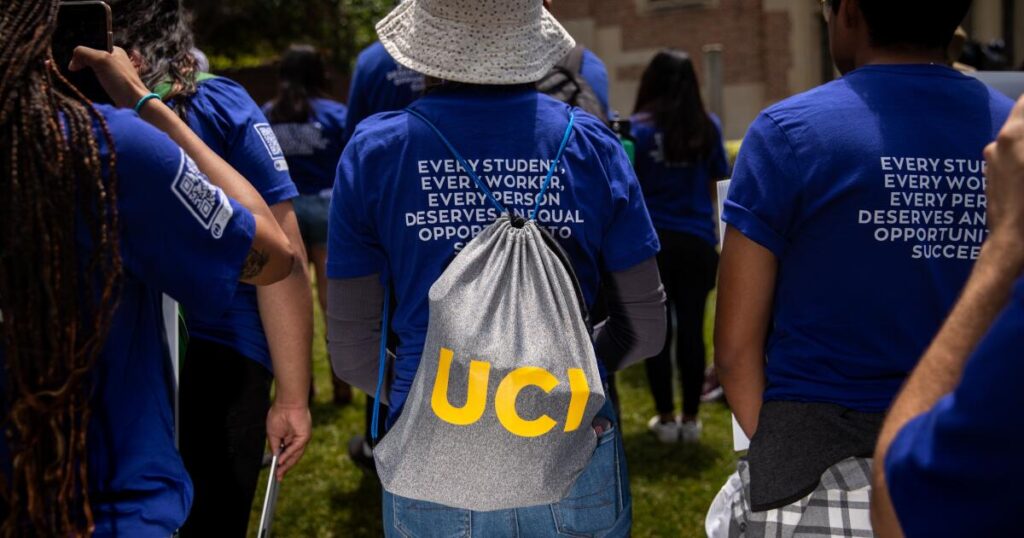Born in Mexico and brought to the U.S. by her parents when she was 1, Sara has lived in California nearly all her life. As an undocumented immigrant, she pays in-state tuition rates at East Los Angeles College — $619 per semester, a fraction of the $5,286 charged to out-of-state students.
Because of her immigration status, Sara is not eligible for Pell Grants and other federal student aid. Under a 2001 state law and the California Dream Act — Sara pays lower in-state tuition and receives state financial aid for college — she has been able to afford her education. When she receives her associate’s degree, she intends to transfer to a Cal State or UC campus and major in business administration.
But Friday her dreams felt more out of reach, after the Trump administration sued California, alleging the state’s laws granting in-state tuition rates and financial aid to undocumented students are illegal. The suit threatens the higher education goals of about 80,000 undocumented college students, many who arrived in the state as children.
“After I get my degree, I want to use it to work in California and contribute to my community,” said Sara, who requested to withhold her last name because she is fearful of federal immigration enforcement action. “How does that hurt anyone?”
Trump seeks to overturn California law
The Department of Justice on Thursday sued California and its three public higher education systems, seeking to overturn a decades-old state law that provides lower in-state tuition to undocumented students who have attended the state’s high schools. The Trump administration also sued to put an end to the California Dream Act, which it alleges gives illegal preference for financial aid to people who are not citizens.
The moves are the latest in a series of similar legal actions the federal government has taken this year against states including Texas, Kentucky, Illinois, Oklahoma and Minnesota.
U.S. Atty. Gen. Pam Bondi said the government took the action because California has a “flagrant disregard for federal law.”
State leaders disagreed, saying they will defend the laws.
“The DOJ has now filed three meritless, politically motivated lawsuits against California in a single week. Good luck, Trump. We’ll see you in court,” said Izzy Gardon, a spokesperson for Gov. Gavin Newsom. The other suits are against the Proposition 50 redistricting effort and a state law banning federal immigration agents from hiding their identities with masks.
Though other states have faced similar suits, California — with the largest number of undocumented students in the nation — stands as the biggest such test case of Trump’s second term. California has prided itself on its expansive public higher education system and its pioneering support of immigrant communities.
“It’s another attack on immigrants. So not a surprise at all,” said Atty. Gen. Rob Bonta, who said he would “review the case and identify any appropriate responses to it.” Bonta noted that with tuition and aid policies, California is “making its own decision. We have 10th Amendment state sovereignty.” He said the state is “using our own funds and following all the laws, and that Trump “really wants to micromanage the policy of cities and of states.”
In 2001, lawmakers passed AB 540, which gives in-state tuition rates to all students who graduated from California high schools after attending for at least three years. The California Dream Act passed a decade later and opened up state aid, including Cal Grants, to undocumented students. It was later expanded to include students who were citizens but had an undocumented parent.
The Trump administration’s challenge to California’s tuition and aid statutes focuses on a 1996 federal law that says people in the U.S. without legal permission should “not be eligible on the basis of residence within a state … for any post-secondary education benefit unless a citizen or national of the United States is eligible for such a benefit … without regard to whether the citizen or national is such a resident.”
Legal scholars have debated whether the federal law affects California tuition and aid laws because the price tags apply to citizens and non-citizens alike.
Critics of Trump’s actions also say the law does not speak specifically to tuition rates. Some courts have interpreted the word “benefit” to include cheaper tuition.
Higher education institutions maintain that their tuition practices abide by the law.
“California Community Colleges are open-access institutions dedicated to serving all students. The California Community Colleges will follow all legal obligations and fully participate in the judicial process alongside our state partners,” said Chancellor Sonya Christian.
Community colleges enroll the vast majority of undocumented immigrant students in the state. Between 12,000 and 14,000 of such students attend CSUs and UCs.
“Although we cannot comment on ongoing litigation, our commitment remains unchanged: We will continue to ensure that all students who qualify under state law have access to an affordable, high-quality education,” Christian said. “We will also continue to comply fully with all current federal and state requirements.”
How students are responding
For students like Sara, the lawsuit stirs more uncertainty in a year she said has “shaken” immigrant communities, including her relatives who are citizens and permanent legal residents.
“We have ICE raids, we have people picked up off the street and in their homes. Now they don’t even want us to educate ourselves?” she said. “This is my home, not a place I can’t remember where I was born.”
Juan, an undocumented student at Cal State Northridge, shared similar sentiments. He also traveled as a toddler with his parents from Mexico to the U.S. and pays in-state education fees.
“Even with that, it is expensive — you pay for gas, books, computers,” said Juan, who requested that his last name not be used.
Juan has an older sibling who was approved for Deferred Action for Childhood Arrivals, which provides work authorization to people who moved to the U.S. as children and lack legal status. The program has largely been closed to new applications for years, so his options to earn money are limited.
“I help my parents, siblings and friends with odd jobs — running social media accounts, housework, pet-sitting,” he said. “That money can help pay for the lower tuition rates. It cannot cover out-of-state rates.”
At CSU Northridge, the in-state rate per semester is $3,925, compared with $10,585 for non-California residents.
Ju Hong, who attended UC Berkeley as an undocumented student and directs the UCLA Dream Resource Center, said he was “devastated” by the suit.
“I think we are going backwards,” said Hong, who was born in South Korea. “Immigrant youth and students and organizers won major victories with AB 540 though ground-up organizing for decades. This is not just about a legal action. It’s an attack on immigrant students and youth who have grown up, have studied here and contributed to California.”
Jack Feng, a graduate student at UCLA and immigrant rights advocate, said the moment calls for broader support for undocumented students across UC.
He said UC “should join the state of California in aggressively litigating against this attack.”
“UC should expand immigration legal services, mental health resources, and emergency financial aid for undocumented students,” said Feng, who is the external vice president of the UCLA Graduate Students Assn.
Legal questions loom
Ahilan Arulanantham, co-director of the Center for Immigration Law and Policy at UCLA Law School, said California’s tuition law does not appear to violate the federal law the Trump administration is using in its challenge.
“Federal law prohibits certain benefits to undocumented students based on residency in the state. But AB 540 does not make people eligible based on residency,” he said. “Instead it ties eligibility to whether students have graduated high school and attended three years of high school in the state.”
He said the difference between residency and high school graduation is a key legal point.
Arulanantham explained that in-state tuition is open to all students, regardless of legal status. But all students must meet the California high school attendance and graduation criteria — even if they now live in another state.
“There are lots of citizens who would not qualify for in-state tuition under a residence-based rule — but who do qualify based on the graduation criteria,” he said.
Arulanantham said California’s tuition law has at times helped more students who have legal documentation than those who do not.
A 2012 report from the University of California that tallied AB 540 recipients from 2002 to 2011 showed that, in those years, U.S. citizens and people with legal authorization were frequently more likely to make use of the law than undocumented immigrants.
In the 2010-2011 academic year, the report said, 1,260 documented UC students received California resident tuition rates compared with 620 “potentially undocumented” people.
UC said it has not compiled a public report of more recent data.
The California law has withstood earlier challenges. The state Supreme Court upheld it in 2010 after out-of-state students sued. The U.S. Supreme Court refused to hear an appeal of the case.
In those cases, judges said undocumented immigrants were not receiving preferential treatment because of their immigration status but because they attended and graduated from California schools. They said U.S. citizens who graduated from the state’s schools had the same opportunity.
Thursday’s complaint was filed in the Eastern District of California. In June, after the Trump administration sued over the law in Texas, the state agreed to stop giving in-state tuition to undocumented immigrant students. Kentucky and Oklahoma also said they would not defend their tuition laws.
Undocumented students have joined the Kentucky case to fight to keep the law there in place and are attempting to do the same in Oklahoma. Illinois and Minnesota said they would challenge the Trump lawsuits against their states. None of the cases have reached a conclusion.
Times staff writer Seema Mehta contributed to this story.
The post The college dreams of 80,000 undocumented California students threatened by Trump suit appeared first on Los Angeles Times.




